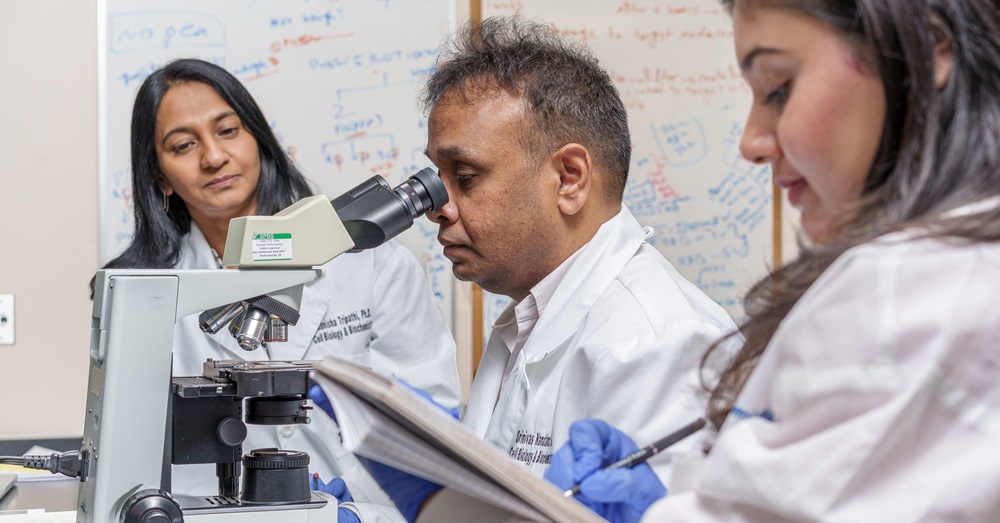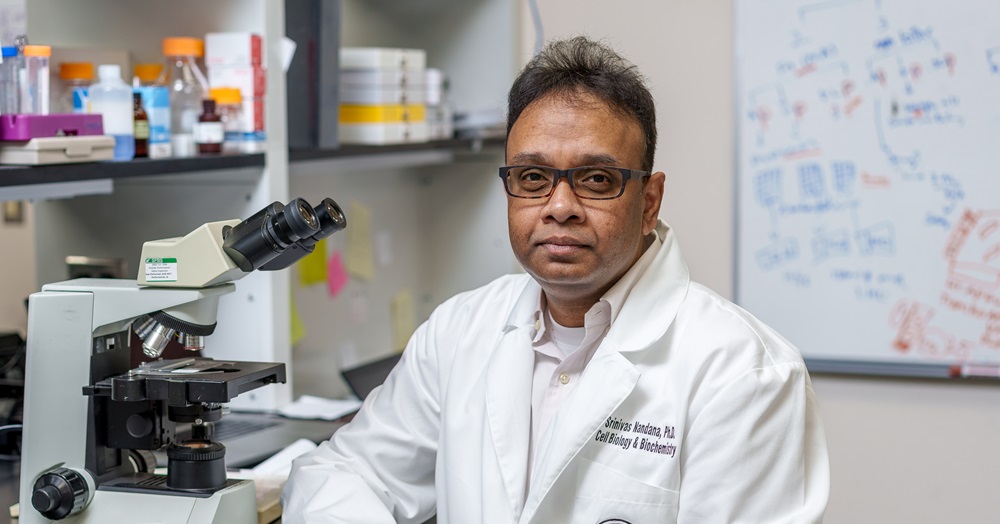Study Focuses on Resistance to Androgen Receptor-Targeted Therapy in Advanced Prostate Cancer

According to the American Cancer Society, approximately 1 in 8 men in the U.S. will be diagnosed with prostate cancer during their lifetime. In addition, about 1 in 44 men will die from the disease, placing it second behind lung cancer as the leading cause of cancer death among American males.
The androgen receptor is a key protein that drives the progression of prostate cancer. When androgens (hormones responsible for developing male characteristics) bind to the androgen receptor, they regulate the growth of prostate cancer cells, making the androgen receptor a primary target for treatments using androgen receptor signaling inhibitors. However, prostate cancer eventually becomes resistant to the inhibitors, which leads to a form of disease known as castrate-resistant prostate cancer.

In an effort to find new treatments for castrate-resistant prostate cancer, a Texas Tech University Health Sciences Center (TTUHSC) research team led by Srinivas Nandana, Ph.D., and Manisha Tripathi, Ph.D., from the Department of Cell Biology and Biochemistry at the TTUHSC School of Medicine recently completed a study that focused on uncovering the molecular and signaling mechanisms that drive the progression of advanced prostate cancer. Their study (“A TBX2-Driven Signaling Switch from Androgen Receptor to Glucocorticoid Receptor Confers Therapeutic Resistance in Prostate Cancer”), which was published in December 2024 by Oncogene, placed particular emphasis on overcoming resistance to androgen receptor signaling inhibitors.

The study was primarily funded by grants from the U.S. Department of Defense, the Cancer Prevention Research Institute of Texas-Texas Regional Excellence in Cancer, the Ted Nash Long Life Foundation and The CH Foundation.
“In our lab, we study a protein called TBX2, a transcription factor (a protein that helps to convert DNA into RNA) that regulates the expression of multiple genes,” Nandana said. “Previous studies from our team have shown that TBX2 is over-expressed in castrate-resistant prostate cancer, and the goal of this project was to investigate how TBX2 drives castrate-resistant prostate cancer development, particularly its role in conferring resistance to enzalutamide.”
Based upon their previous research, the Nandana-Tripathi team knew the TBX2 protein is elevated in advanced prostate cancer, especially in castrate-resistant prostate cancer. However, Nandana said the study revealed three unexpected and significant findings.
The first finding showed that TBX2 drives therapy resistance in castrate-resistant prostate cancer by acting as a switch, shifting the signaling pathway from the androgen receptor to the glucocorticoid receptor. Nandana said it achieves this by rerouting cellular signaling from the androgen receptor to the glucocorticoid receptor, allowing cancer cells to continue growing despite treatment. Second, the team identified a strategy to target this TBX2-driven switch in prostate cancer by disrupting the protein complex with which TBX2 interacts. Third, the study consistently showed pairwise correlations between the protein activities of TBX2, androgen receptors and glucocorticoid receptors in castrate-resistant prostate cancer patients and in patients with early-stage prostate cancer who initially respond to androgen-receptor targeted therapies.
“Resistance to androgen-receptor targeted treatments is a major challenge in treating advanced prostate cancer,” Nandana said. “Our study suggests that by looking at the relationships between the TBX2, the androgen receptor and the glucocorticoid receptor proteins in early stages of the disease, we might be able to predict which patients are at higher risk of developing advanced prostate cancer, particularly castrate-resistant prostate cancer that no longer responds to treatments like enzalutamide. Identifying these patients early could open the door to therapies that target the androgen receptor-to-glucocorticoid receptor switch, including those that disrupt TBX2 function, offering a promising new treatment approach.”
Nandana said this discovery is significant because scientists have long been searching for ways to restore sensitivity to androgen receptor signaling inhibitors in prostate cancer. The team’s findings suggest a promising approach that could block the harmful switch without the severe side effects typically associated with directly targeting transcription factors like glucocorticoid receptors, offering a potentially safer and more effective treatment strategy.
“Our next steps involve creating new models of castrate-resistant prostate cancer to further investigate other molecular factors that drive the switch from the androgen receptor to the glucocorticoid receptor in castrate-resistant prostate cancer,” Nandana said. “Additionally, we aim to identify novel drugs that could target this mechanism and offer potential new treatments for castrate-resistant prostate cancer.”
Related Stories
National Academy of Inventors Names TTUHSC Faculty Senior Members
The National Academy of Inventors (NAI) has designated two current and one former TTUHSC faculty researchers as Senior Members.
TTUHSC Cancer Researcher Honored by National Academy of Inventors
C. Patrick Reynolds, M.D., Ph.D., director of the School of Medicine Pediatric Cancer Research Center at TTUHSC, has dedicated his life as a researcher to developing treatments for childhood cancers.
TTUHSC’s Hudson Set to Serve as President for Society of Clinical Research Associates
The Society of Clinical Research Associates (SOCRA) has elected Texas Tech University Health Sciences Center’s (TTUHSC) Catherine Hudson, Dr.P.H., as its president for 2025-2026.
Recent Stories
National Academy of Inventors Names TTUHSC Faculty Senior Members
The National Academy of Inventors (NAI) has designated two current and one former TTUHSC faculty researchers as Senior Members.
The John Wayne Cancer Foundation Surgical Oncology Fellowship Program at Texas Tech University Health Sciences Center Announced
TTUHSC is collaborating with the John Wayne Cancer Foundation and has established the Big Cure Endowment, which supports the university’s efforts to reduce cancer incidence and increase survivability of people in rural and underserved areas.
TTUHSC Receives $1 Million Gift from Amarillo National Bank to Expand and Enhance Pediatric Care in the Panhandle
TTUHSC School of Medicine leaders accepted a $1 million philanthropic gift from Amarillo National Bank on Tuesday (Feb. 10), marking a transformational investment in pediatric care for the Texas Panhandle.
